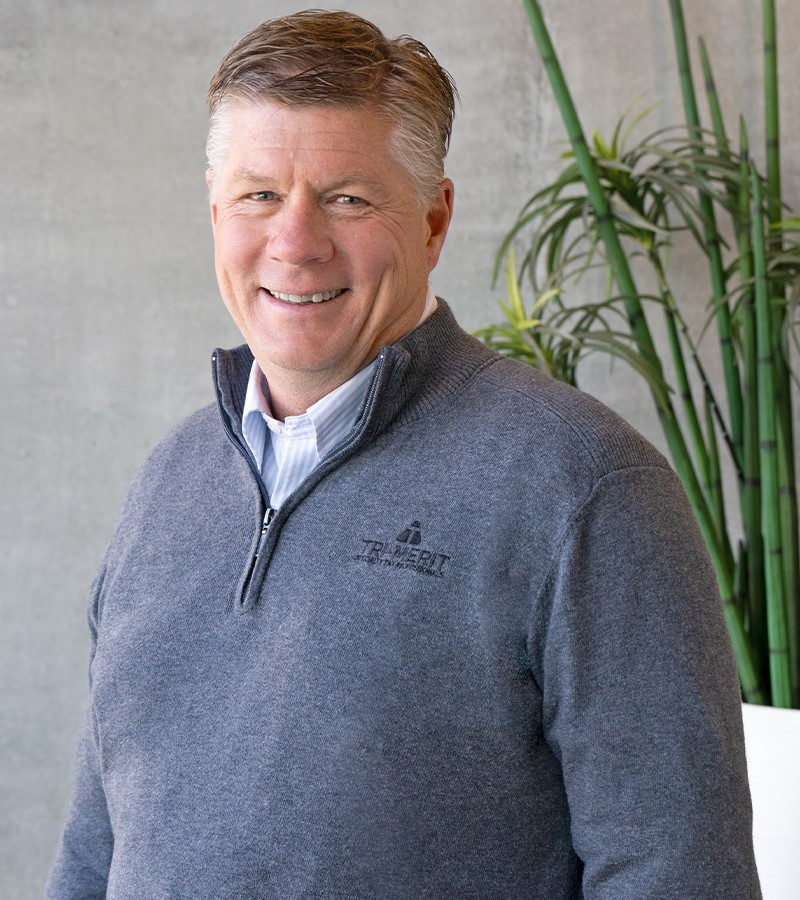Randy Crabtree, '85, Advocates for Reinventing the Accounting Industry to Prioritize Mental Health
By Lia Kizilbash Gillet

After Randy Crabtree, CPA, ’85, suffered a stroke in 2014, he stepped back from his managing partner role at Tri-Merit Specialty Tax Professionals and began speaking out about mental health awareness, corporate culture and employee engagement within the accounting profession.
Named one of 2023’s Top 100 Most Influential People in Accounting by Accounting Today, Crabtree remains a partner at Tri-Merit, the company he co-founded. He hosts "The Unique CPA Podcast," which ranks among the world’s 5% most popular programs, according to Listen Notes.
“The accounting profession is a high-stress profession based on constant looming deadlines, time pressure, workload, client expectations, high stakes, seasonality and lack of support staff,” he said. “I share solutions I have learned from so many people over the years to reduce the stress, burnout and the negative impact on mental health.”
Crabtree speaks at industry conferences, webinars, and podcasts, presents at firms, and serves on various boards and advisory councils. He hosts Bridging the Gap, a conference bringing together colleagues from diverse backgrounds to learn, network and prioritize their health. He has written articles for industry magazines and hosted webinars about mental health awareness, taxes, corporate culture, firm growth, and personal growth.
Despite his busy calendar, Crabtree says he doesn’t feel like he works a single day.
“I have found the intersection between my passions and skills,” he said. “It’s an amazing thing, and that's where success lies.”
The intersection took years to achieve. Growing up in Arlington Heights, Illinois, Crabtree attended NIU to study computer science. NIU is where he met his wife, Kathy, and made lifelong friends.
“My time at NIU was one of the best experiences of my life,” he remarked. “I truly loved everything about being there. The people who significantly impacted my life are the people I met at NIU.”
In the first year of his career, Crabtree worked as a programmer but quickly realized that although he enjoyed it, he didn’t see it as his future. After trying a role in sales the following year, he said a “light bulb went off.”
“I was returning from a sales call when I remembered the one accounting class I had at NIU and how much I enjoyed it,” he said. “At that moment, I decided I was going to quit my job, go back to school full time and become a CPA. When I did this, I set a goal for myself that four years after starting in the accounting profession I would start my own firm. That happened about three and a half years later.”
Crabtree also started a real estate development and construction firm doing mixed-use development projects in the Chicago suburbs. After selling his accounting and real estate firms in the same year, he started Tri-Merit, helping CPA firms around the country with various tax credits and incentives. In 2022 and 2023, Tri-Merit was listed on the Inc 5000 list of fastest-growing privately held companies in the U.S.
Nothing, though, has been more challenging for Crabtree than mentally recovering from his stroke.
“I was very fortunate to recover physically fairly quickly,” he said. “But the mental aspects of recovery lasted for years. I ended up seeking the help of a therapist to help me figure out what was going on inside my head. As CPAs, we are used to being the ones that have the answers. Our clients need help, and we're always there for them. So, from a personality standpoint, it's hard to admit we don’t have the answer and need help.”
Crabtree worked with therapists to help him accept that although he cannot control his future, he can control and make changes to the way he thinks. Today, passionate about mental health awareness, he is working to help move the accounting profession forward and prevent others from going down a negative mental health path.
“Overall time management and a change of mindset are two of the biggest adjustments someone can make to balance the demands of this profession and maintain a healthy work-life balance,” he said. “The accounting profession has been dominated by hourly billing over the years. Charging for an hour of time is not nearly as important as charging for knowledge. Knowledge has value, so I encourage accounting professionals to base their pricing models on the outcome, not the time spent. If we can start doing that, I think time management becomes much easier, especially when we can quantify the value of the service we just delivered.”
Crabtree says he has seen a shift at Tri-Merit and the firm’s culture and that successful firms are trying to follow suit with the hope of circumventing the employee shortage seen in the accounting profession. The firm now values employees for who they are, not their job titles. Crediting CPA and comedian John Garrett’s book “What’s Your And?” for defining and igniting this value system, Crabtree says the firm's leadership gets to know everybody based on their personal passions and not just for the skills they bring to work.
Recently, Crabtree has seen innovative firms reinventing the modern work week by only working Monday through Thursday, eliminating tax-season weekend work, implementing technology, restructuring pricing practices, concentrating on advisory services, and thoughtfully reflecting on their business models. He has witnessed small changes making significant impacts on employees, like 15-minute walks twice a day to help the mind refresh, avoiding meals at your desk, and turning off at the end of the day.
The same holds true for firms. Crabtree has helped others build the firm of their dreams by realizing they don’t have to be the answer for every client. He suggests servicing only clients or an industry you are passionate about.
“The accounting profession has been pretty much structured the same way for many years,” he explained. “I see a real renaissance going on with ownership structures and believe this will have a big, positive impact on the cultures within firms. We are at the very beginning of a transformation of the accounting profession, and I'm very excited to see this continue.”
Crabtree is grateful for his health recovery coupled with his own version of a professional renaissance. Seeing opportunities where others may not, coupled with being unafraid to take risks, has allowed him to heal and share his knowledge.
“I am very fortunate,” he stated. “At this point in my career, what motivates me is to see some of the things that I do make a difference in people's lives and careers, and at a small level, I think I'm making a difference for our profession.”
